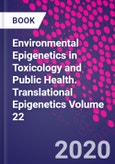Environmental Epigenetics in Toxicology and Public Health provides in-depth discussions of the suite of complex environmental factors shown to impact epigenetic components within the cell, as well as evidence that these epigenetic modifications are tied to early and later life health effects. This book offers a translational research perspective, highlighting both in vivo and human population-based evidence for ties between the environment, the epigenome, and health outcomes, with an emphasis on evidence for transgenerational effects of exposures, as well as developmental windows of susceptibility to environmentally-linked epigenetic effects.
This volume in the Translational Epigenetics series aides in the development of new therapeutic options meant to reverse inappropriate epigenetic alterations, helping researchers in their efforts prevent and treat a variety of chronic diseases tied to environmental exposures.
Please Note: This is an On Demand product, delivery may take up to 11 working days after payment has been received.
Table of Contents
Section I. Epigenetic Mechanisms/Machinery 1. DNA methylation/chromatic regulation/non-coding RNAs 2. Tools for the assessment of epigenetic regulation
Section II. Transdisciplinary approaches for the study of environmental epigenetics 3. Model organisms and their application in environmental epigenetics 4. Epidemiological concepts in environmental epigenetics
Section III. Epigenetic programming of disease in relation to the environment 5. Pregnancy and Birth outcomes 6. Neurodevelopment outcomes 7. Cancer 8. Respiratory dysfunction 9. Immune dysfunction 10. Cardio/Metabolic disease 11. Aging
Section IV. Transgenerational epigenetic effects of the environment 12. Transgenerational effects of environmental contaminants
Section V. Epigenome-targeted therapies in environmental health science 13. Nutrition 14. Manipulation of Epigenetic machinery
Section VI. Conclusions and Future Perspectives 15. Conclusions and Future Perspectives: The environment and the epigenome








